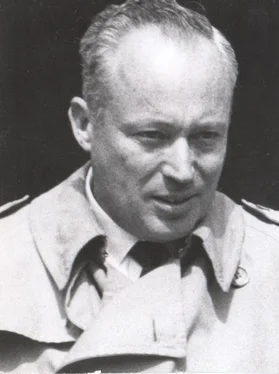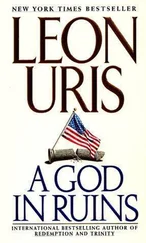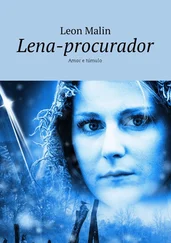All the new ideas—revisionist, socialist, communist, intellectualism—were merely expedient and radical ideas which took the place of the true basic faith.
Although he did not agree with the new ideas, he was compassionate toward them. He understood that it took enormous inner strength not to be able to rebel against the abuses the Jews had suffered. These new forms of Zionism, therefore, were rebellions by weak men who could not suffer in silence and dignity, to pray and to accept as part of life the penalties imposed by God for being worthy of being the chosen guardians of the Holy Law.
After the Germans shut his synagogue, he worked harder than ever keeping up the morale of his people. During the storm of directives his quiet strength and counsel were constantly sought.
It was after such a strenuous day that Alexander Brandel arrived in his study. The old man looked forward to the relaxation and verbal swordplay with the learned Zionist historian.
They recounted the terrible things of the day with mutual sadness, went through all the accepted amenities, then Alex got down to business.
“We feel the urgencies of the day call for us to set aside the things which divide us,” Alex said carefully, “and unite in those upon which we agree.”
“But, Alexander, two Jews never agree on anything.”
“On certain things, Rabbi Solomon. On taking care of orphans. On helping each other.”
“And what shall we do on those things which you claim we agree?”
“We shall first hold a meeting. I have many diversified leaders who have agreed to attend. If you would come, it would be a signal for most of the rabbis in Warsaw to follow suit.”
“Do you have support from the Bund?”
“Yes.”
“And the Federation of Labor Zionists?”
“Yes.”
“And the Communists?”
“Yes.”
“Such a meeting will be a mess.”
“There is another intention.”
“Aha.”
“We must try to present a unified front to stop these German directives.”
“So? Well, Alexander, I am not a social worker. I am also not a politician. I am merely a teacher. As for civil problems, we have a Civil Authority to cope with most of the problems which you pose.”
Alex promised himself not to become discouraged. He started again. “The Jewish Civil Authority was hand picked by the Germans. We feel they merely wish to use it as an instrument to carry out their policy.”
“But surely with good Zionists like Emanuel Goldman and Schoenfeld and Silberberg on the Authority—”
“But, Rabbi, they are truly without power. These are extraordinary times and call for extraordinary measures.”
“What is so extraordinary about these times, Alex?”
“We could be possibly engaged in a struggle for our very survival.”
The old man smiled and stroked his big bushy white beard. How dramatic these young people were! “Alexander. Tell me, learned historian, when in the history of the Jewish people has survival not been an issue? Sometimes the degrees varies. What is happening today in Poland has happened many times in our history. Now tell me, Brandel the historian, have we not outlived every tyrant in the past?”
“I think there is a difference.”
“So?”
“From the time of the First Temple we have been massacred because of scapegoatism, expedience for the ruling politicians, passion outbursts, ignorance. The Crusades, the Inquisition, the Worms massacre, the Cossack uprisings. Never before have we been faced with a cold-blooded, organized, calculated, and deliberate plot to destroy us.”
“And how does the learned historian know this to be true?”
“I read Adolf Hitler.”
“Aha. Tell me, Alexander, what do you suppose the Germans stand to gain by destroying the Jews? Will they gain territory? Will they gain more than token wealth? What can be the ultimate goal in doing away with some of the world’s finest doctors, musicians, craftsmen, scientists, writers? What is the point that they will win by doing it?”
“It is not the matter of winning a point. They started on us the same way a hundred others started on us, but in the case of the Germans, I do not know if they will be able to stop themselves. Like no other people in history, they are psychologically geared to destroy merely for destroying.”
“So, what you are saying is that the Nazis are evil. As a historian, surely you know that evil destroys itself.”
“It may also destroy us while it is destroying itself. Where does it say in the Talmud and Torah, Rabbi, that we are not supposed to defend ourselves?”
“But we do defend ourselves. We defend ourselves by living in the faith which has kept us alive all of the centuries. We defend ourselves by remaining good Jews. It will bring us through this hour as it has through all the rest of our crises. And the Messiah will come, as He has promised.”
“And how do you suppose we will recognize Him?”
“It is not if we recognize Him. It is if He will recognize us.”
The argument was at a dead end. The old man would not budge.
Alex took his armband off and held it in front of the Rabbi’s eyes. “Can you wear this with pride?”
“It was good enough for King David.”
“But he did not wear it as a badge of humility!”
“Alexander, why must all Zionists shout? The gates of heaven are barred to those who pick up weapons of death. That is what will come ultimately to you if you form a band of rabble. Learn to suffer in humility and faith. That alone will be our salvation.”
Chapter Six
DIRECTIVE
ALL GOVERNMENT PENSIONS FOR JEWS ARE HEREBY SUSPENDED.
DIRECTIVE
JEWS ARE FORBIDDEN TO PATRONIZE NON-JEWISH FOOD MARKETS AND DEPARTMENT STORES.
DIRECTIVE
TRAVEL PERMITS ARE REQUIRED FOR JEWS LEAVING WARSAW. JEWS ARE RESTRICTED TO SPECIAL COACHES MARKED “JEWISH.”
DIRECTIVE
JEWS ARE FORBIDDEN TO STAND IN RATION LINES EXCEPT AT SPECIFIED JEWISH STATIONS.
Alexander Brandel’s quest for solidarity was frustrating. There was confusion among the people. Most of them were not connected with organizations. They wanted merely to be able to take care of their families. The few men whose power and influence could have rallied everyone were marched to Pawiak Prison and shot.
Mayor Starzynski, who had made the epic fight for Warsaw and was one of the few Poles in high positions to give the Jews credit for their contribution to the defense of the country, disappeared. Like many another, he was taken off in the middle of the night without explanation and never returned.
Alex watched his fellow intellectuals disintegrate. These men who had once gushed forth waterfalls of idealism seemed unable to put their words into practice.
He courted Rodel, the Communist, who controlled an important organization. The baldheaded, chain-smoking leader of the Communists spent most of the time explaining how the Soviet Union truly saved eastern Poland by jumping her from the back while the Polish army fought for its life. Rodel was always amusing to Alex. He had an amazing range of verbal dexterity and political acrobatics. In the spring of that year Rodel had been violently anti-Nazi. In the summer, after the Russian-German pact, he decided the Germans weren’t so bad, after all—it was the Western powers who had really sold everyone down the river. Now he was violently anti-German once more but spent most of his time explaining away Russian treachery. Rodel had no use for Zionism simply because he had no use for anything that was not communism. Nonetheless, Alex needed Rodel. To ignore the Communists would be worse than to be refused by them. The Communists, with their non-Jewish members, boasted the closest-knit group for the Jews. But Rodel was having his hands full. The Communists were being hounded by the Nazis even more unmercifully than the Jews. The Gestapo had a single order covering them: FIND THEM AND SHOOT THEM.
Читать дальше












